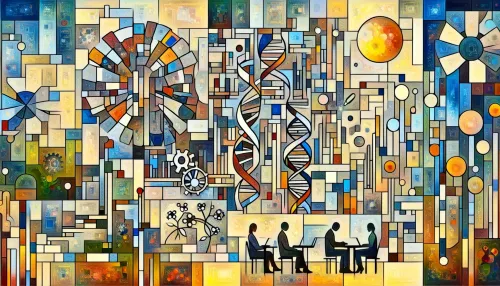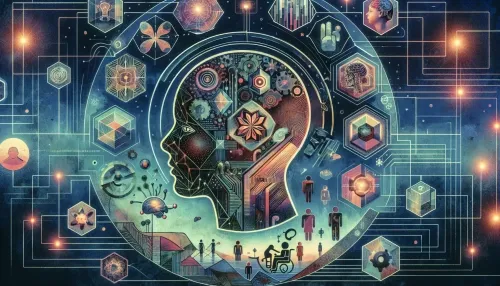The Mysterious Impact of Neurodiversity on Autistic Children

Neurodiversity, a concept that views neurological differences as natural and valuable, has gained significant attention in the context of autism spectrum disorders. For the audience of HorizonsMind Blog, understanding this intricate connection is essential to gain a comprehensive perspective on autistic children's experiences.
Exploring the Connection Between Neurodiversity and Autism
Autism, often characterized by differences in social communication and restrictive, repetitive behavior patterns, is intrinsically linked to neurodiversity. The enigmatic influence of neurodivergence on autism spectrum behaviors encompasses a wide array of cognitive processes, shaping the unique experiences of autistic individuals.
What is Neurodiversity?
Neurological diversity within the autistic population extends far beyond the conventional understanding of brain function. While traditional perspectives often pathologize these differences, As we recognize the intrinsic value of diverse neurological experiences.
In exploring the intricate web of neurological diversity in autistic individuals, it becomes evident that neurodivergent traits manifest in various forms, contributing to the rich tapestry of human cognition. By embracing this diversity, society can create more inclusive environments that honor the unique neurological profiles of autistic children.
Related Article: Charting the Unseen Spectrum: Advancements in Neuroimaging for Autism Understanding
The Value of Neurological Diversity in Autism
The enigmatic influence of neurodivergence profoundly shapes the cognitive processes of autistic children. From sensory processing disparities to information retention and problem-solving abilities, neurodiversity intricately intertwines with every aspect of cognitive function.
Recognizing that unraveling this influence is crucial for comprehending and supporting autistic children effectively. By acknowledging and embracing diverse cognitive processes, caregivers, educators, and policymakers can foster environments that nurture the innate strengths of neurodivergent individuals.
The Influence of Neurodivergence on Cognitive Processes
Sensory sensitivities are a hallmark feature within autism spectrum disorders, and their connections with neurodiversity add another layer to the mystique surrounding autistic experiences.
Related Article: Precision in Paintbrush Strokes: A Scientific Approach to Nurturing Artistic Talents in Autistic Children
How Neurodiversity Shapes Learning and Problem-Solving
Understanding how neurodiversity intersects with sensory sensitivities enables caregivers and professionals to implement tailored strategies that mitigate sensory overload and support optimal sensory regulation in autistic children. This holistic perspective aligns with the values upheld by HorizonsMind Blog, emphasizing inclusivity and empowerment through knowledge.
Sensory Sensitivities and Neurodiversity in Autism
Neurodiversity stands as a fundamental aspect of autism spectrum experiences, encompassing a myriad of cognitive, behavioral, and emotional dimensions. The profound impact it holds shapes the identity and lived realities of autistic children in ways that continue to intrigue researchers, advocates, and caregivers alike.
Related Article: The Enigmatic Link Between Autism and Genetic Code
Strategies for Supporting Sensory Regulation
The audience of HorizonsMind Blog is encouraged to recognize this mystique as an integral part of autism spectrum experiences. By fostering understanding and acceptance of neurodiversity's role within autism, we can create nurturing environments where every child's unique journey is celebrated and supported.
In conclusion, as we delve into the mysterious impact of neurodiversity on autistic children, it becomes evident that embracing diverse neurological experiences is paramount in fostering inclusivity and empowerment. By uniting insights from research, advocacy, and personal narratives, HorizonsMind Blog celebrates the enigmatic connection between neurodiversity and autism spectrum behaviors while affirming its significance in transforming perspectives and shaping meaningful interventions for autistic children.
Frequently Asked Questions
Neurodiversity is the concept that neurological differences, such as those found in autism, are natural variations of human cognition. It emphasizes the value of these differences rather than viewing them solely as disorders. This perspective helps to understand and appreciate the unique experiences and strengths of autistic individuals.
Sensory sensitivities are common among autistic children, impacting how they perceive and respond to sensory stimuli. These sensitivities can lead to overwhelming experiences, making it essential for caregivers and educators to implement strategies that support sensory regulation. Understanding these sensitivities helps create a more inclusive environment for autistic individuals.
Recognizing neurodiversity is crucial for supporting the development of autistic children, as it fosters understanding and acceptance of their unique cognitive profiles. By embracing neurodiversity, caregivers and educators can create nurturing environments that celebrate individual strengths, ultimately enhancing the well-being and growth of autistic individuals.
Check Out These Related Articles

Unearthing Potential: Gene Therapy's Promise in Autism Treatment

Global Collaboration: Advancing Autism Research and Care Across Borders

Navigating the Future: Neuroenhancement Therapies for Autistic Children
